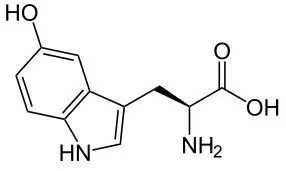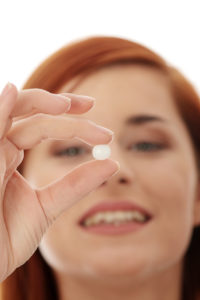Table of Contents
5-HTP (5-Hydroxytryptophan or oxitriptan) is an amino acid that is naturally produced in your body. 5-HTP is synthesized from the amino acid tryptophan which we get from food.
5-HTP is the immediate precursor of serotonin. And as a nootropic and dietary supplement, 5-HTP is popular with those who advocate its effectiveness in treating depression. Along with a number of other serotonin-related diseases.
But using 5-HTP for treating depression and anxiety is not supported by science. The research is contrary to how 5-HTP is viewed by many, including medical doctors.
When we dig into the research, we find that 5-HTP may be contraindicated for depression in those whom marketers advocate its use.[i]
We’re all for boosting neurotransmitter levels and optimizing cognitive performance here at Nootropics Expert®. But now and again I run into a nootropic or dietary supplement that may be popular. But also may be a particularly bad idea.
We’re going to get to the bottom of how 5-HTP works in your brain in this review. We’ll examine why it’s critical for brain health. And reasons why you may want to find another way to boost serotonin levels in your brain.
5-HTP helps:
- Anxiety & Depression. 5-HTP is synthesized into serotonin in brain cells. Elevating levels of serotonin can help relieve the symptoms of anxiety and depression.
- Neurotransmitters. 5-HTP is a necessary ingredient for serotonin synthesis which boosts mood and social behavior, improves memory, regulates appetite and digestion, sleep, sexual desire and function.
- Brain Optimization. A critical balance of the primary neurotransmitters serotonin and dopamine are needed for the highly optimized brain. When these neurotransmitters are not in balance it affects mood, memory, cognition, decision-making, sexual desire, and a host of other critical life functions.
What is 5-HTP?
5-HTP (5-Hydroxytryptophan or oxitriptan) is an amino acid that’s synthesized from the essential amino acid tryptophan.

Tryptophan is hydroxylated by tryptophan hydroxylase to 5-HTP (5-hydroxytryptophan), then decarboxylated to serotonin (5-hydroxytryptamine or 5-HT).[ii]
Tryptophan → 5-HTP → serotonin
80-90% of your body’s serotonin is made in your intestines. But serotonin cannot cross the blood-brain barrier. So all the serotonin that your brain needs has to be made within the brain. This is where 5-HTP comes in…
5-HTP crosses the blood-brain barrier more readily than tryptophan. And gets synthesized into serotonin at a faster rate than from tryptophan.[iii]
As a neurotransmitter, serotonin influences directly and indirectly, the majority of brain cells. So if you want to boost serotonin in your brain, some find that supplementing with 5-HTP is better than taking tryptophan.
Tryptophan, which your body uses to make 5-HTP, can be found in turkey, chicken, milk, potatoes, pumpkin, sunflower seeds, turnip and collard greens, and seaweed.
5-HTP as a nootropic supplement is a naturally occurring amino acid derived from seed pods of Griffonia simplicifolia, found in West and Central Africa. 5-HTP content in extracts of this plant vary from 2 – 20.83% (from seeds obtained in Ghana).[iv]
How does 5-HTP work in the Brain?
5-HTP is a precursor to serotonin. The neurotransmitter serotonin plays a role in sleep, appetite, learning & memory, mood, and sexual function.
When tryptophan’s role in converting to 5-HTP for boosting serotonin doesn’t work efficiently, the result is often depression, chronic headache and insomnia.
An open-label trial was conducted in Italy to determine the efficacy of using 5-HTP in young subjects with high levels of “romantic stress”.
Serotonin has been linked to human romantic attachment. So researchers in this study set out to determine brain levels of Brain-Derived Neurotrophic Factor (BDNF) and serotonin in relation to changes in romantic stress during the study.
15 healthy subjects (mean age 23.3 years) who had a “romantic breakup” took part in the study. Participants received 60 mg of Griffonia simplicifolia extract containing 12.8 mg 5-HTP daily for 6 weeks.
The subjects were evaluated for BDNF and serotonin levels at the beginning of the study, at 3 weeks and then again at the end of the 6-week trial.
The scientists observed significant improvements in romantic stress scores from weeks 0 through 3. So far, 5-HTP seems to be working. But no further improvement was seen from weeks 3 through 6. Even though the young people had significantly higher levels of BDNF and serotonin.[v]
More Involved in Depression and Stress than Serotonin
This “romantic breakup” study is a classic illustration of why using 5-HTP alone to treat depression and stress may not work. And if it does work, why it may not work for long.
Depression is often more than simple serotonin dysfunction. Depression can also be associated with catecholamine dysfunction, including dopamine and/or norepinephrine. Or a combination of serotonin and catecholamine dysfunction.
When you take 5-HTP alone, you are also depleting dopamine, norepinephrine, and epinephrine. Synthesis of serotonin from 5-HTP, and dopamine from L-DOPA is catalyzed by the same enzyme, L-aromatic amino acid decarboxylase (AAAD).
Dopamine and serotonin precursor supplementation must be taken in proper balance. Because when you use only 5-HTP, it dominates dopamine at the AAAD enzyme synthesis level.
Blocking dopamine synthesis at the AAAD enzyme through competitive inhibition will lead to depletion of dopamine and the rest of the catecholamines.[vi]
Going back to our Italian study of young people dealing with “romantic stress”, the subjects stopped responding to 5-HTP in the 2nd half of the study. Likely because their catecholamines became depleted through continuous 5-HTP supplementation.
Studies have found that when dopamine is depleted enough, 5-HTP will no longer function.[vii]
Catecholamine Dysfunction Affects More Than Just Depression
When catecholamine neurotransmitter levels (dopamine and/or norepinephrine) influence depression, supplementing with 5-HTP alone is not the way to go. Because you may deplete dopamine and norepinephrine, worsening the disease and its underlying cause.
But this contraindication is not exclusive to depression. It extends to all other diseases where catecholamine dysfunction has been implicated. Including ADHD[viii], obesity, anxiety, seasonal affective disorder (SAD), and Parkinson’s Disease.[ix]
How things go bad
 Amino acid precursors of serotonin (i.e. 5-HTP) and dopamine (i.e. L-Tyrosine) work together during synthesis, metabolism and transport to the point that they function as one system.
Amino acid precursors of serotonin (i.e. 5-HTP) and dopamine (i.e. L-Tyrosine) work together during synthesis, metabolism and transport to the point that they function as one system.
When serotonin and dopamine are properly balanced, functions that are regulated only by serotonin, can be regulated by manipulating dopamine levels. And functions regulated only by dopamine in this balanced state can be regulated by manipulating serotonin.[x]
When you mess with this balance and improperly supplement with serotonin or dopamine precursors, you don’t get the desired effect of using that nootropic. And you increase the possibility of side effects with too much serotonin.
If you supplement with only one precursor (i.e. 5-HTP to boost serotonin) that dominates the other system (i.e. dopamine synthesis), depletion of the dominated system will occur (i.e. depleted dopamine).
And if this effect is pronounced enough, you will not get the benefit you were aiming for when supplementing with the original precursor (i.e. 5-HTP).
A powerful example of this effect is in the management of Parkinson’s Disease where the effects of L-DOPA are no longer observed over time due to serotonin depletion.[xi]
Since serotonin and dopamine cannot cross the blood-brain barrier, the number of serotonin and dopamine molecules in the brain is a function of the amount of nutrients (amino acid precursors) that are available to be synthesized into new neurotransmitter molecules.
Optimizing brain function with minimal side effects is NOT a function of supplementing until you get sufficiently high amino acid levels. It’s a function of achieving the proper balance between serotonin and dopamine.
5-HTP benefits
5-HTP is absolutely critical for synthesis of serotonin in your brain. But supplementing with 5-HTP to boost serotonin does not work well.
Using 5-HTP to treat depression has had very little success over the last few decades of clinical trials and biohacking.
Integrating 5-HTP into your nootropic stack is much more complicated than simply adding some 5-HTP in order to boost serotonin.
5-HTP alone will not work for depression, or any other issue you’re dealing with involving the catecholamines (dopamine, norepinephrine, epinephrine) because of 5-HTP’s tendency to deplete those neurotransmitters.
5-HTP will boost serotonin in your brain.[xii] But 5-HTP must be carefully stacked with precursors for dopamine and norepinephrine or you risk making the situation worse.
You must avoid supplementing with only one of the serotonin or dopamine amino acid precursors. When amino acid precursors are not in balance, you end up with decreased effectiveness of that nootropic, increased side effects, and depletion of the non-dominant system.
How does 5-HTP feel?
Reactions to supplementing with 5-HTP vary considerably but the one consistent theme is initial feelings of well-being, better sleep, less need for sleep, improved mood, less social anxiety, lower appetite, improved tolerance for stress and improved cognitive function.
And after a couple of weeks of dosing 5-HTP – side effects begin. Serotonin overload results in dopamine and norepinephrine depletion.
Side effects include feelings of lethargy, depression, brain fog, stomach pain, and possibly a chronic tension type of headache. Worst case scenario is nausea, vomiting and even blacking out.
Neurohackers who report consistent success supplementing with 5-HTP stack it with B-Vitamins, a dopamine precursor like L-Tyrosine, and only use 5-HTP as needed.
Those who have a bad experience with 5-HTP from the start often have no idea why they’ve reacted badly. But an educated guess is their depression was catecholamine (dopamine, norepinephrine, epinephrine)-related. And boosting serotonin made their dopamine-related issues worse. Very quickly.
One huge word of WARNING: Do NOT take 5-HTP with any antidepressant medication. You put yourself in the very real danger of Serotonin Syndrome which can ultimately kill you.
5-HTP Clinical Research
5-HTP supplements are heavily marketed as a natural remedy for depression. But the science does not support using 5-HTP for depression. We have decades of clinical trials available. And there is no evidence of the efficacy in using 5-HTP for depression.
5-HTP instead of selective serotonin reuptake inhibitors
The Department of Public Health at the University of Queensland Medical School in Australia did a systematic review of literature dating from 1966 – 2000 for “5-HTP” and “depression”.
The researchers found 108 clinical studies of which only 2 studies, one with serotonin (5-HT) and one with L-Tryptophan for a total of 64 patients met sufficient quality criteria to be included. These studies suggest serotonin (5-HT) and L-Tryptophan are better than placebo at alleviating depression.
But the researchers noted “the small size of the studies, and the large number of inadmissible, poorly executed studies, cast doubt on the results from potential publication bias, and suggests that they are insufficiently evaluated to assess their effectiveness.”[xiii]
5-HTP for Fibromyalgia
A double blind controlled study in Italy studied the efficacy of using 5-HTP in treating fibromyalgia symptoms.
50 patients with primary fibromyalgia syndrome were selected for this study. This 1990 study did not publish the amount of 5-HTP used. But the researchers found a significant improvement in fibromyalgia symptoms with only mild and transient side effects.[xiv]
5-HTP for Treatment of Depression
Insufficient activity of the neurotransmitters serotonin and norepinephrine is a central element of the model of depression most widely held by neurobiologists today.
In the late 1970’s and 1980’s, numerous studies were performed in which depressed patients were treated with the serotonin precursors L-Tryptophan and 5-Hydroxytryptophan (5-HTP), and the dopamine and norepinephrine precursors Tyrosine and L-Phenylalanine.
A summary published in the Alternative Medicine Revue looked at the data from all these studies. The author noted that the nature of the studies makes it difficult to draw firm conclusions regarding the efficacy of neurotransmitter precursors for treating depression.
While there is evidence that precursor loading could work, particularly for serotonin precursor 5-HTP, more studies of suitable design and size “might lead to more conclusive results”.[xv]
Those studies have not materialized since that report was published 22 years ago.
5-HTP Recommended Dosage
Recommended dosage of 5-HTP if you’re going to try it is 50 mg 1 – 3 times per day.
Some studies have used higher doses than the recommended dose, but 5-HTP can be toxic for your central nervous system at high doses.
For anxiety or depression, 5-HTP is dosed at 150 – 300 mg per day total.
To relieve post MDMA (Ecstasy) depression, 5-HTP 100 mg on Day 3-7 after MDMA use.[xvi]
Successfully supplementing with 5-HTP requires stacking it with a dopamine precursor like L-Tyrosine or L-DOPA along with B-Vitamins (for synthesis), and one of the sulfur-containing amino acids (methionine, cysteine, homocysteine, or taurine).
And you must monitor the effects this stack is having on your body. If you start experiencing side effects of any kind, it’s a good indication that either serotonin or dopamine is out of balance.
DO NOT combine 5-HTP with any kind of antidepressant medication.
Combining SSRI’s, Tricyclics or MAOI’s with 5-HTP will cause Serotonin Syndrome. An extremely dangerous condition involving severe mental changes, hot flashes, rapidly fluctuating blood pressure and heart rate, and possibly coma leading to death.
Serotonin Syndrome can kill you. And I’m not kidding here.
5-HTP Side Effects
5-HTP supplementation can cause heartburn, heart palpitations, headache, stomach pain, nausea, vomiting, diarrhea, drowsiness, sexual problems and muscle issues.
5-HTP can also cause some pretty radical mood changes including agitation, aggressiveness, anxiety, euphoria, poor decision-making, irritability, psychosis, restlessness and insomnia.
5-HTP can make the symptoms of schizophrenia, bipolar disorder and other mental disorders worse.
Serotonin Syndrome
And I can’t emphasize this enough so I’m going to repeat it here in case you missed it…
DO NOT combine 5-HTP with any kind of antidepressant medication. Or with carbidopa.
Combining SSRI’s, Tricyclics or MAOI’s with 5-HTP will cause Serotonin Syndrome. An extremely dangerous condition involving severe mental changes, hot flashes, rapidly fluctuating blood pressure and heart rate, and possibly coma.
And combining 5-HTP with carbidopa also has the potential of causing Serotonin Syndrome.
Serotonin Syndrome can kill you. And I’m not kidding here.
Type of 5-HTP to Buy
5-HTP is made from tryptophan in your body.
5-HTP as a nootropic supplement is made from extracts of the African tree Griffonia simplicifolia. 5-HTP supplements are typically in tablet or capsule form.
You’ll often find 5-HTP in many ready-made vitamin and herbal formulas.
Nootropics Expert Recommendation
5-HTP 50 mg up to 3-times per day
 I DO NOT recommend using 5-HTP as a nootropic supplement.
I DO NOT recommend using 5-HTP as a nootropic supplement.
Your body does synthesize 5-HTP on its own to make serotonin in your brain. And you can’t get 5-HTP from food. But you can get L-Tryptophan from food which is synthesized into 5-HTP in your body.
5-HTP may help you if you’re dealing with depression. But you must stack if with a dopamine amino acid precursor along with B-Vitamins and a sulfur-containing amino acid. See the “5-HTP Recommended Dosage” in this review above.
IF you are going to try 5-HTP, I suggest starting with a dose of more than 50 mg daily. You may want to take it in the evening because it could help sleep disorders.
Short-term dosing of 5-HTP of no more than 2 weeks seems to provide the most benefit if you’re going to benefit from this nootropic.
Or try using 5-HTP only on an “as needed” basis. For a mood boost, reduce social anxiety, and provide a short-term boost in cognition.
5-HTP supplementation on its own is NOT recommended. Nor is it recommended for long-term use.











Join The Discussion - 359 comments
David
June 30, 2019
Hello david I will start off by saying your sight is incredible the mount of information about nootropics packed into one site is amazing. I have recently been experimenting with all sorts of nootropics I was curious first of all should I target all transmitters in the same day or how should I approach each neuron transmitter
Andreas
November 5, 2019
Hello David,
I want to start taking tryptophan and tyrosine together but I’m wondering if adding l-dopa to them would be even better?
Thank you
David Tomen
November 6, 2019
Andreas, L-Tyrosine should be taken during the day and L-Tryptophan before bed. Too much dopamine in the evening will prevent you from sleeping and too much serotonin during the day will make you sleepy.
Adding L-DOPA to this is only a good idea if your brain needs the extra dopamine.
Francesco
June 24, 2019
Hi, David,
I’m sorry, if I understand correctly:
1) ssri does not increase serotonin,?
With ssri, serotonin is not eliminated, but its increase is zero?
2) With 400 mg griffonia = 50 mg of 5 htp, instead, there is an increase in serotonin?
3) ssri, must they be hired continuously, even 5 htp?
Or 5 htp, must be taken 3 weeks, and then, do a week of suspension?
So: 3 weeks yes, 2 weeks no? Even for 10 – 20 – 30 years?
ps: I intend to take 400 mg griffonia = 50 mg 5 Htp after dinner and 250 mg Mucuna Pruriens 15% L – Dopa = 37.5 mg before breakfast (5 days a week)
Hi, thank you very much. Francesco (Italy)
David Tomen
June 24, 2019
Francesco, Selective Serotonin Uptake Inhibitors (SSRI) block the uptake of serotonin usually in the synapse. Which in theory at least forces more serotonin to be available in the brain. SSRIs DO NOT increase serotonin. You can only increase serotonin with a precursor such as L-Tryptophan or 5-HTP.
I do not understand your #3. But your P.S. does work. But you may need to increase the amount of Mucuna to keep dopamine in balance with serotonin.
Francesco
June 25, 2019
Hi David, thank you very much for your reply and advice.
Look at point 3: I know that ssr must be taken every day.
5 htp should be taken every day?
Or 5 htp assumes three weeks yes and a week does not?
5 HTP should be cycled? or not ?
About L-Dopa, one capsule contains 15% of L-3,4-dihydroxyphenylalanine and 250 mg of Mucuna Pruriens seed extract !!!
Is it little?
Would it be better to take 2 or 3 capsules?
Many thanks and best regards. Francesco
David Tomen
June 25, 2019
Francesco, are you currently using a SSRI? Because if you are then using 5-HTP is far too dangerous without professional supervision. And in this case it would be minute-by-minute supervision.
Same thing with Mucuna but possibly to a lesser extent and depending on what the SSRI is.
Francesco
June 26, 2019
Hi David, in the past I have used different ssri, but without benefits. Plus I had sexual problems and low libido.
Now I have done a research and I have seen that 5 htp and l-dopa can give me benefits (which I didn’t have with ssri) without sexual side effects.
Mucuna Pruriens Haya Labs Velvet bean extract 60 mg (min. 98% L-Dopa)
L-Dopa I will take 60 mg Wednesday – Friday – Sunday
120 mg Thursday and Saturday
Monday Tuesday break
Does 5 htp have to be cycled (series)? Or not?
Should I take it for three weeks and then take a break (one week)? Or not?
……… or 5htp does not need to take breaks?
Thanks
David Tomen
June 26, 2019
Francesco, in my humble opinion neither nootropic needs to be cycled. As long as you keep dopamine and serotonin in balance. If one is forced too high it depresses the other. But be very careful with 5-HTP. Because a little goes a long way.
I personally get 100 mg 5-HTP lozenges and use a pill splitter to cut them into quarters. Then put 25 mg of 5-HTP under my tongue as needed. Usually 2 or 3 times per day.
Chris
May 23, 2019
Hi David,
Thanks for all of the advice and experience you bring to the comments on this page!
I’ve recently come off Cymbalta which is an SNRI and on reading it somewhere I’ve been managing my terrible discontinuation syndrome using a daily ‘stack’ of 50mg 5-HTP and 500mg L-tyrosine. It has really helped – although i’ve felt wired and a little ‘speedy’ at times.
Would you recommend I slowly tail off my daily dosage at some point rather than taking 5-HTP and L-tyrosine for an indefinite period?
David Tomen
May 23, 2019
Chris, your symptoms are more likely caused by withdrawal from Cymbalta than from the low doses of 5-HTP and L-Tyrosine you are using.
Try reducing the nootropic dosage in half and see if that helps. If not, then Cymbalta withdrawal is the likely culprit.
Kevin
May 14, 2019
Hi David,
I have suffered from occasional low mood and anxiety for a while after a stressful time. I have had really good results from a low, 250g dose of St John’s Wort. My sleep duration and quality could be better though, the SJW improves things but not totally. Is there anything that can be safely stacked with SJW to improve sleep quality?
thanks,
David Tomen
May 14, 2019
Kevin, the ingredients in this stack should work with St. John’s wort: https://nootropicsexpert.com/best-sleep-supplements-to-buy/
Ben
May 10, 2019
How long does 5HTP stay in your system…?
I have been taking 100mg 5htp with melatonin and GABA 750mg for some really bad insomnia i have been experiencing. I have done this for one week and it is helping me sleep but i want to switch to Essential amino acids to start naturally helping myself sleep. How long do i have to wait after taking 5htp can i start taking tryptophan as part of an essential amnio acid supplement.
David Tomen
May 10, 2019
Ben, I’d switch from 5-HTP to L-Tryptophan right away. No need to wait.
Peter
April 30, 2019
Hi David
is 5-htp,L-tyrosine and ashwaganda safe together?
thanx
David Tomen
May 1, 2019
Peter, yes you can stack these 3 together as long as you stay within recommended dosages for each.
Filip
March 15, 2019
Hi. I am using now Lexapro and I decide I want to go natural way… I am using lexapro 10mg and when I stop is it 5HTP 50 mg too low, should I go with 100mg? Is 100mg 5HTP with 500mg L-Tyrosine ok or should I go with 50mg:500mg ratio? Thanks
Filip
March 15, 2019
Or maybe 100mg:1000mg ratio? 🙂 Thanks
Filip
March 15, 2019
Or maybe 100mg:1000mg ratio is better?
David Tomen
March 15, 2019
Filip, there’s no way to tell unless you try different dosages. But always, always start with the lowest recommended dose for each nootropic. For example, try 500 mg L-Tyrosine and 25 or 50 mg 5-HTP. L-Tyrosine is much more ‘forgiving’ than 5-HTP.
You many find that you need twice as much 5-HTP with that dosage of L-Tyrosine but the only way to find out is experimenting. Everyone is ‘wired’ differently and responds uniquely to these nootropic supplements.
But please DO NOT use 5-HTP while using Lexapro because it is far to dangerous.
Filip
March 15, 2019
Thank you. Can I take 5HTP immediately when I stop lexapro or I need to wait few days?
David Tomen
March 16, 2019
Filip, I’d give it a week to be safe and then start with a low dose.
Kay Williams
March 14, 2019
Hi. I have not seen this situation, but maybe I missed it.
I have taken Paxil and Trazodone forever. 2 1/2 years ago surgeons removed my colon and appendix. Each day it seemed the P&T was working less and less. Without knowing where Vits and Mins and Nutrients are absorbed, I tried taking a lot of different Vits and some Mins. Then I tried some sublinguals (Melatonin, different brands), but did not work. I can never go to sleep before 3 a.m. I seem to be getting worse every day.
David Tomen
March 15, 2019
Kay, your question is way beyond my area of expertise. Your digestive system is critical for well … digesting food and supplements so they make their way into your system. For example, 5-HTP is used the synthesize serotonin. And where does serotonin get manufactured? In your gut.
I suggest finding a naturopath or integrative physician who can walk your through this. And help you find a solution.